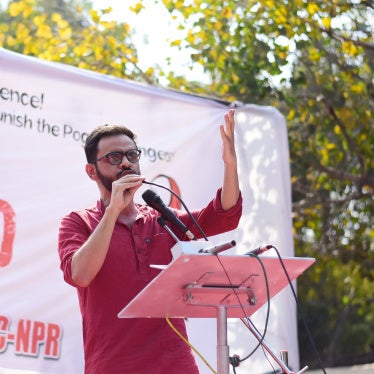On Aug. 26, President Joko Widodo revoked a new regulation that would have imposed onerous restrictions on foreign media in Indonesia. Home Affairs Minister Tjahjo Kumolo subsequently apologized to the president for the “confusion” created by the now-canceled regulation. The proposed regulation was all the more puzzling given Joko’s announcement on May 10 that lifted the restrictions on access to Papua for accredited foreign correspondents. The willingness of some senior officials to even consider such measures is an alarming indicator of the disregard for media freedom among some elements of Joko’s government.
The regulation would have required foreign journalists to get permission from local authorities as well as the State Intelligence Agency (BIN) before doing any reporting in the country. The Home Ministry’s director general of political and general administration, Soedarmo, justified the rule as a means “to monitor all activities of foreign journalists in Indonesia.” The officials behind the rule went so far as to envision a new Foreign Ministry-supervised “Coordination Team of Foreigners Visitation taskforce” staffed by BIN and National Police personnel to vet the reporting plans of foreign journalists.
The proposed regulation was more than just a sinister throwback to the authoritarian media restrictions of the Suharto dictatorship, which collapsed in 1998 after three decades in power. The Indonesian nongovernmental media freedom group Independent Alliance of Journalists (AJI) rightly recognized the rule as an effort to extend nationwide a longstanding restriction on foreign media reporting that previously applied only to the provinces of Papua and West Papua.
For more than three decades, accredited foreign media seeking to travel to Papua have had to apply for that access through a Ministry of Foreign Affairs-supervised interagency “Clearing House” that included representatives of the National Police and BIN. The agency served as a strict gatekeeper by either failing to approve applications for Papua access -- placing journalists in a bureaucratic limbo -- or routinely denying the applications outright. On June 17, the Foreign Ministryannounced that it had abolished the “Clearing House” in line with Joko’s May 10 directive. But the proposed “Coordination Team of Foreigners Visitation taskforce” suggests that elements within the government want the “Clearing House” revived and expanded.
This shouldn’t come as a surprise. Joko’s move to lift access restrictions for foreign journalists has evoked deep hostility among some government and security forces officials who reflexively equate foreign journalists with spies. The day after Joko’s announcement, the then-coordinating minister for political, legal and security affairs, Tedjo Edhy Purdijatno, insisted that foreign correspondents would continue to need special access permits to Papua and that the government would continue to “screen” foreign journalists seeking that access. On May 12, the National Police spokesman, Sr. Comr. Agus Rianto, asserted that the government would continue to restrict foreign correspondents’ Papua access through an entry permit system. Agus said there was a need to maintain foreign media access restrictions to Papua to prevent foreign media from talking to “people who opposed the government” as well as to block the access of “terrorists” who might pretend to be journalists to travel to Papua.
On May 19, the then-commander of the Indonesian Armed Forces (TNI), Gen. Moeldoko, stated that foreign media would continue to require Papua access permits from the Foreign Affairs Ministry’s interagency Clearing House. Moeldoko warned that the Indonesian government would expel any foreign journalists whose Papua reporting was perceived by the government to “undermine our government and state” or whose reports “contain defamation that triggers unrest.” On May 26, Defense Minister Ryamizard Ryacudu warned that foreign media access to Papua was conditional on an obligation to produce “good reports.” Ryamizard didn’t precisely define “good reports,” but he explicitly equated foreign journalists’ negative Papua reporting with “sedition” and threatened expulsion for any foreign journalist whose reporting displeases the government.
These attitudes reflect the uphill battle the president faces in trying to restrain the censorship reflexes of elements of the government and security forces who want not only to maintain their foreign media chokehold on access to Papua, but to make it a template for all of Indonesia. Joko deserves credit for defying them by opposing policies that restrict freedom of expression. But it’s clear that he will need to remain vigilant in ensuring that all elements of his government and the security forces respect, not restrict, media freedom in Papua and beyond.








